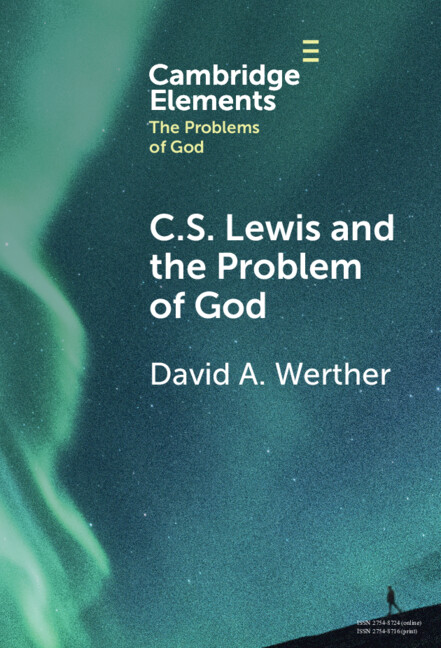C. S. Lewis and the Problem of God

David Werther, C. S. Lewis and the Problem of God. Cambridge Element. Cambridge: University Press, 2024. 76 pages. ISBN 978-1009283243.
Rarely will one find a short monograph filled with such an abundance of pertinent knowledge, such clear and thorough exposition, and such a high level of cogent argumentation as this deceptively thin volume by philosopher David Werther on C. S. Lewis’s philosophy of God. It is a marvel of concision and precision. The series of monographs, Cambridge Elements, covers many topics in philosophy. This volume is part of the “Problem of God,” series, which is edited by Michael Peterson. Each book addresses a problem related to God in short compass.
One is tempted to call this volume a primer, but it seems too sophisticated and packed with academic references for that. The author has obviously mastered both the pertinent and voluminous literature by Lewis and a vast secondary literature about Lewis’s thought.
No Christian writer in the Twentieth Century left a deeper, wider, and richer religious mark in the Western world than Clive Staples Lewis (1898-1963). He is mostly known from his influential nine-volume children’s fantasies, The Chronicles of Narnia and from his perennially best-selling book, Mere Christianity—a book significant enough to warrant a book about itself, C. S. Lewis’s Mere Christianity: A Biography (Princeton University Press, 2020),written by George Marsden. I often ask Christians I have newly met if they have read C S. Lewis, in order to gauge their intellectual engagement in the Christian life. If they have not, I recommend Mere Christianity for starters. While teaching philosophy at Denver Seminary (1993-2024), I taught a course called The Philosophy of C. S. Lewis nearly every other year, thus allowing me a deep engagement of his multi-faceted and brilliant work. If I were to teach that course again, I would assign Werther’s book as one of the texts.
While Lewis was a first-rate literary scholar and a Don at both Oxford and later Cambridge, he is most known for his works in the philosophy of religion, which were generally apologetic in nature. C. S. Lewis and the Problem of God mostly takes up Lewis’s nonfiction writings concerning the existence of God and the truth of the Christian religion but also features a section on the roles of reason and imagination in understanding and defending the Christian faith. However, most of the book addresses Lewis’s nonfiction.
Six sections make up the book. 1. Approaching C. S. Lewis. 2. “A Road Rarely Trodden” The Pilgrim’s Regress. 3. The Case for Theism. 4. The Case for Christianity. 5. Mere Christianity. 6. The Christian Life. Each section is divided into subsections, which makes it a clearly articulated and cohesive exposition of the major aspects of Lewis’s writing on God and the Christian life. Werther not only canvasses the material methodically and fairly, but he also places much of Lewis’s thinking into the larger philosophical debate, including recent appropriations and criticisms of Lewis’s arguments. Each thematic section is concluded with a “For Further Reading” section. This, along with an extensive bibliography, makes the book a delight for scholars who want to hunt down all the sources.
Werther’s treatment of Lewis’s approach to God is respectful, and appreciative, but not one-sided. He considers attacks on Lewis’s arguments—such as the argument that Jesus could not have been merely a brilliant moral teacher, but must be divine as well—carefully, citing appropriate writers on both sides. However, the exposition of Lewis’s main arguments for God and Christianity seems to resist refutation. In my own apologetic writings, I have found his moral argument for God, his argument from reason to God, and his case for Jesus’ deity to be fundamentally sound and worth building on, as are much of what he writes about the problem of evil (although, as a Calvinist, I do not share his libertarian view of human agency).
However, despite my respect for the apologetic work of C. S. Lewis, his account of Christ’s atonement is unsatisfactory. Werther takes this up in 5.4: The Central Christian Belief/Atonement. Lewis was not taken by the idea of penal substitutionary atonement, even calling it “immoral” and “silly” at times, as Werther notes. Lewis held that Christ’s death is necessary for God to redeem sinners, but made the how of the atonement of secondary importance. While he didn’t champion penal substitution, he made room for it as part of several aspects of the atonement. Lewis writes, “I think the ideas of sacrifice, Ransom, Championship (over Death), Substitution, etc., are all images to suggest the realty (not otherwise comprehensive to us) of the Atonement” (47). Werther explains Lewis’s view carefully and lists a critique of Lewis’s rejection of penal substitution in his “For Further Reading” section. However, the centrality of penal substitution in the biblical account of redemption warrants more criticism of Lewis’s rather weak account. The Cross of Christ (InterVarsity, 1986) by John Stott is one of the great modern classics on the atonement defends this historic view.
Despite this last bleat, I commend C. S. Lewis and the Problem of God as an erudite, readable, and noteworthy contribution to both C. S. Lewis studies and to Christian apologetics.
Douglas Groothuis Ph.D.
Distinguished University Research Professor of Apologetics and Christian Worldview
Cornerstone University and Cornerstone Theological Seminary
September 2025
